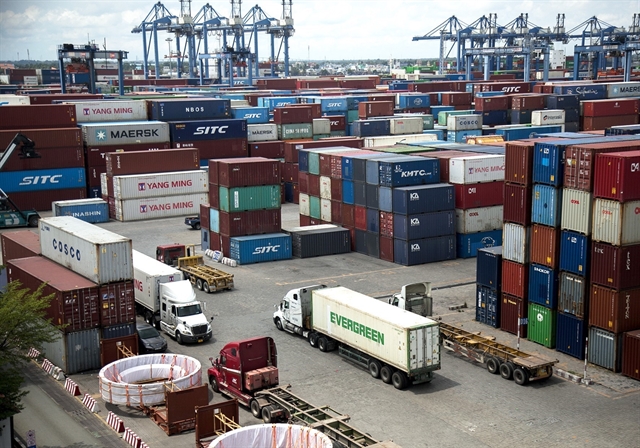

Containers at Cát Lái Port, Việt Nam’s busiest container port. — VNA/VNS Photo
HCM CITY — The United States Agency for International Development (USAID) and the General Department of Vietnam Customs (GDVC) released on Thursday an action plan for reducing congestion at Cát Lái Terminal in HCM City, Việt Nam’s busiest container port.
The action plan, unveiled at a workshop co-organised by USAID and GDVC, contains 21 recommendations to help position the port to meet increasing demand. Before COVID-19, the port was operating at full capacity, with demand as measured by container volume expected to double by 2030.
The workshop brought together more than 70 representatives from Vietnam Customs, ministries, and the business community to discuss the action plan — the result of a Pre-Feasibility Study on Anti-Congestion and Facilitating Trade Logistics at Cát Lái Port conducted by the USAID Trade Facilitation Programme between May 2020 and March 2021.
The study takes a comprehensive look at the 160-hectare port’s operations, to assess performance, bottlenecks, and constraints to increasing port handling capacity, and offers 21 recommendations in the form of an action plan for government and local stakeholders to consider.
These recommendations range from leveraging IT solutions to enhance information flows and cargo clearance, to new or expanded port facilities and improved operational performance.
In addition, through USAID’s INVEST project, USAID is working with the Ministry of Transport’s Vietnam Maritime Authority to examine likely areas for public-private partnership, which is an effective way to mobilise investment for large-scale infrastructure projects.
“As international trade recovers from the impacts of COVID-19, addressing congestion at Cát Lái Port has become a priority. When implemented, the anti-congestion measures identified at today’s workshop will facilitate international trade, contributing to Việt Nam’s competitiveness both in the region and in the world,” said Mai Xuân Thành, GDVC Deputy Director General.
“Easing congestion at Việt Nam’s ports will become increasingly important as trade rebounds in the post-COVID-19 environment. The Cát Lái Port Pre-Feasibility Study conducted by USAID recommends an action plan for Việt Nam's busiest container port to help position it to handle a projected surge in container volume. This effort reaffirms our ongoing commitment to support the Government of Việt Nam in its efforts to facilitate trade and investment and increase its competitiveness,” said Ann Marie Yatishock, USAID/Vietnam Mission Director.
Approximately 4.9 million 20-foot containers (TEUs) are handled in HCM City each year, which equates to about three million trucks, or more than 8,000 trucks per day transiting in and around the city to discharge or load containers from the port area. Cát Lái Port handles over 92 per cent of this volume and roughly 50 per cent of the country’s total container volume.
The five-year, $21.7 million USAID Trade Facilitation Programme (2018-2023) is supporting the Government of Việt Nam to adopt a risk-management approach to customs and specialised inspection, strengthening the implementation of the World Trade Organisation’s Trade Facilitation Agreement.
The programme works with the Ministry of Finance’s GDVC to standardise customs procedures, strengthen national and provincial coordination, and build the capacity of customs officials. The aim of the programme is to support Việt Nam in developing a more attractive trade and investment climate for enterprises, traders and investors. — VNS